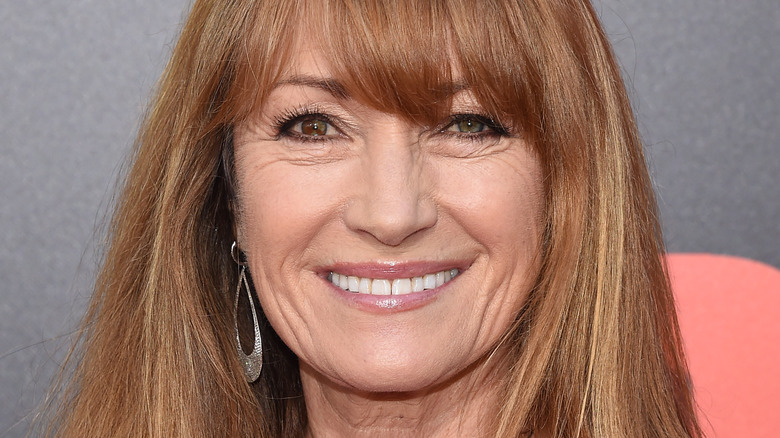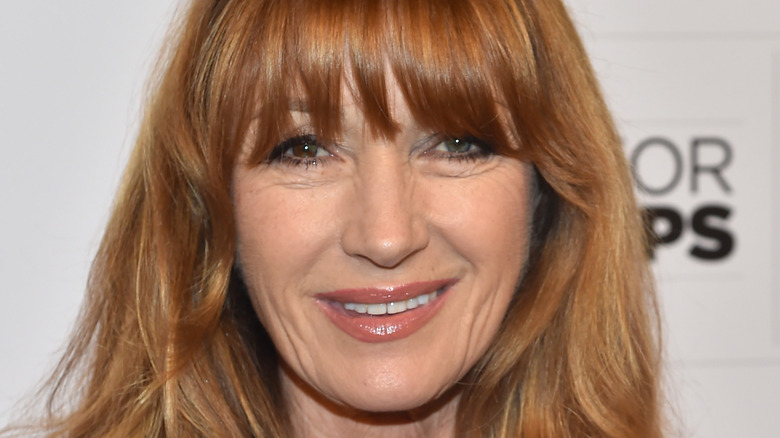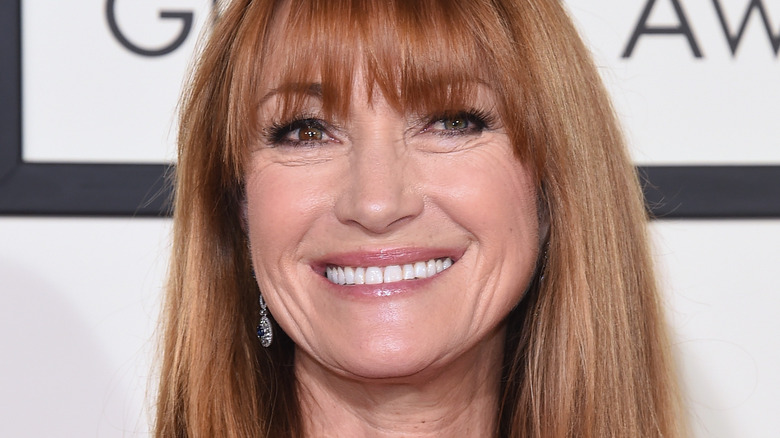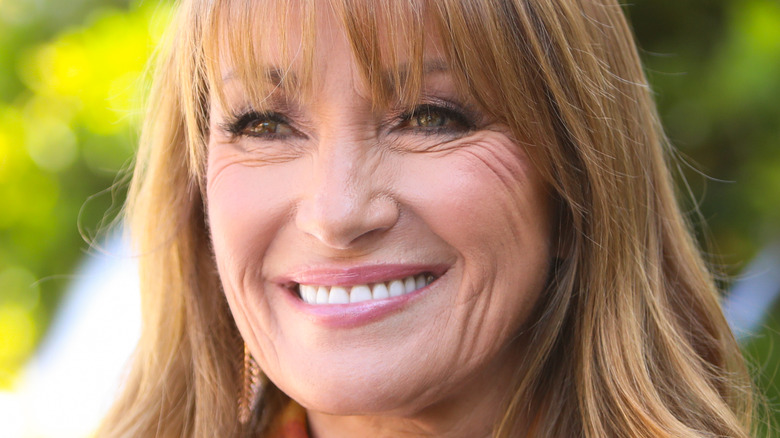Jane Seymour Discusses Harry Wild And Her Most Challenging Roles - Exclusive Interview
We all need and deserve a little time off every once in a while, but you have to accept that you need the downtime. Still, some cannot, and they find themselves in a wild scenario that could've only been born from restlessness and/or nosiness. Such is the case for Harriet "Harry" Wild in Acorn TV's new series, "Harry Wild." Portrayed by legendary actress Jane Seymour, Harry is a retired English literature professor in Dublin, Ireland, who finds herself embroiled in her detective son's case because she's simply too bored to stay in retirement full-time. She's spurred to action when she's robbed one day, but it's ultimately her own tenacity that leads her down the path of solving her son's mystery before he can.
"Harry Wild" meets at the intersection of comedy and serious, ominous thriller, all in the name of a campy time. Seymour brings to the table decades worth of experience, including from notable roles in "Dr. Quinn, Medicine Woman," "Live and Let Die," "Wedding Crashers," and "Somewhere in Time," among many more films and series. She's also had real-life experiences that could've helped prepare her. Seymour has four ex-husbands, which undoubtedly pushed her to grow as a person as well as an actress.
Luckily, we at The List had the opportunity to chat with Seymour ahead of "Harry Wild's" premiere, and she detailed everything you need to know, including which of her prior credits best prepared her for the role, whether she researched murder mysteries before filming, and what fans can ultimately expect from the series.
Jane Seymour teases Harry Wild
What can you generally tell us and tease about "Harry Wild"?
It's what they call a "soft crime murder mystery comedic piece." Harry is basically Professor Harriet Wild. She's been a professor of English at Trinity Dublin for 25, 30 years. [She] loves her subject, but does not love the fact that most of the kids she's teaching would rather be out partying and skipping school and not bothering and wasting their mother's and father's money. One day [she] says, "I'm done."
And [you think], "What? You're done? Now what you going to do, knit? Get a cat, be a little old lady?" No, I don't know what I'm going to do.
In the first episode, she decides she'll have an arrangement with a man that she knows who's willing, bottle of wine and let's get together and she's off to do that. On the way to the wine store, [she] gets mugged by a young boy. We find out afterwards that he didn't really mean to, and he's actually a really good guy and he ends up becoming her sidekick. She inadvertently finds herself recovering with her son, who's a detective, and [her] daughter-in-law and none of them really want her there.
They all leave her alone. She's bored. She reads the case notes, looks at the TV and [thinks], "Wait a minute. I can figure this crime out. I know exactly." With great excitement, [she] tells her son, "I got it." He says, "That's itm Mom. Never. Out of here, go away. I don't want to know you anymore. You can't do this. This is my work. You don't know what you're doing." She's right. And she's always right.
She solves crimes ultimately with the help of her 15-year-old kid who is trying to quit school, who came from the wrong side of the tracks, whose father's a professional criminal and an addict and an alcoholic and in the worst circumstances ever. The two of them together solve these extraordinary crimes.
On if her comedy work helps prepare her for serious roles
Your character studies literature as a professor. Being a murder mystery, we get Agatha Christie vibes. How did you prepare for the role and were there any points of reference like Christie or otherwise that maybe you turned to?
No, it was all there in the script. What I did do was research what English professors looked like and how they behaved and what they would be like and whether this made sense, and it did. I created the look, which was not a look I've done before. I [used] leather jackets and rain coats and no makeup, hair stuck with the pencil in it. When I was reading some of the murders that are connected to literature, I reread at least the CliffsNotes of what that book was, so I had a pretty good idea of why and how that worked.
I had the privilege of working with the best cast. Because of COVID, we weren't supposed to be together, but I had a little sneaky time on weekend, either on my rooftop where I was renting in Ireland or in a very open room, we'd all come together and over a glass of wine or two, we would talk about the characters, we'd read the lines. We rehearsed it and played with it. We all got to know each other really well. We bonded as a family, we bonded as a crew and as directors and writers. I don't think I've ever had an experience where we were all really that close. It wasn't like, "Oh, you work tomorrow. I work yesterday." No, it was like, we're all making this together.
I feel like those relationships really translate on screen, which is wonderful. Recently, you've been doing some really amazing comedy work, like on "B Positive." This show also has comedic charm, but it also has very serious tones as well. How do you approach transitioning between genres like that? Does your comedy work also help inform your more serious work, too?
Oh, absolutely. The way that comedy is written and performed these days, it's not performed as comedy, it's performed very earnestly and very realistically and the more serious you are, the funnier it is. That's the way it is. To me, comedy is enhanced reality.
On how her career helped her prepare for Harry Wild
It's life. Let's face it, sometimes something terrible happens and then for no reason, you laugh about something and you can't believe you did. Then, you go back to actually caring about what's really happened. There's some elements of that, but good writing is good writing and I've had the privilege of working with some wonderful writers. Chuck Lorre is fantastic and I did "[The] Kominsky [Method]" with him and "B Positive" and then, working with great actors that they brought in on that series, that was fantastic. The higher the caliber of the actors you work with and the better the material, the better the experience.
I wanted to ask you a little bit about that as well. You've had decades of amazing experience. Which roles have pushed you to hone your acting craft, and were there any that specifically helped you with this role?
"War and Remembrance," I dove very deep into that. It was a very hard, heart wrenching, difficult shoot, nine months. I was all over Europe and pretty much what's happening right now on the border of Russia, the same stuff was happening. We filmed in Auschwitz, and it was all very realistic. I was surrounded by people who survived and my parents had survived World War II. That was a very big one.
"East of Eden" was an amazing role. I played [Cathy Ames] from 13 to [her] late 50s, American classic. How can you not hone your skills with that? [Another role was] "Dr. Quinn," because it was great material, but my God, to get up every day and do nine, ten pages of that outside, literally if it was frost on the ground or it was a hundred and something degrees, or we had rattlesnakes, or we had mountain lions or we had fires, it all happened there. It was pretty amazing.
I've played Maria Callas, which I got the Emmy for. That was really cool because I had to learn all these arias and had to fake sing and I had to play this amazing character. I played Marie Antoinette in "The French Revolution," no one told me I was playing it in French. I had a week in which to make sure that I could at least say what Marie Antoinette had to say in French. I learned to be fluent in French. Each one has its challenge.
[For] "Wedding Crashers," the challenge was, why am I the only woman in the [film] who is actually naked? What went wrong here? Why am I at this age and they have body doubles? Hmm. Okay. But it was funny.
Acorn TV's "Harry Wild" premieres on April 4, with new episodes airing weekly thereafter.



